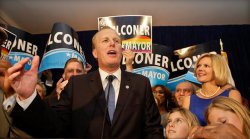 As Mayor-elect Kevin Faulconer prepares to take power at City Hall, voters here are well aware what the game plan of a Republican mayor looks like.
As Mayor-elect Kevin Faulconer prepares to take power at City Hall, voters here are well aware what the game plan of a Republican mayor looks like. As Mayor-elect Kevin Faulconer prepares to take power at City Hall, voters here are well aware what the game plan of a Republican mayor looks like.
As Mayor-elect Kevin Faulconer prepares to take power at City Hall, voters here are well aware what the game plan of a Republican mayor looks like.
It's the strategy used by former Mayor Jerry Sanders, a Faulconer supporter, as he struggled to pull the city out of a financial mess: Keep city spending low, maintain a tight rein on labor unions, support business interests to help create jobs.
But less clear is what Faulconer's surprisingly easy victory Tuesday over Democratic Councilman David Alvarez — 55% to 45% — means for the statewide GOP, which now holds no statewide offices.
"Faulconer overnight goes from minority member of the City Council to the highest ranked and highest profile Republican in the state," said Carl Luna, a political science professor at San Diego Mesa College.
Allan Hoffenblum, a former GOP strategist who now publishes the nonpartisan California Target Book, said Faulconer's victory shows that Republicans can still win big races "if they have the right candidate," noting that Faulconer campaigned as a fiscal conservative who is moderate on social issues, including supporting gay marriage and abortion rights.
"If you want to elect more Republicans, make sure you have a candidate who is a good fit for the district instead of one who passes some ideological litmus test," Hoffenblum said.
In San Diego terms, the election was yet another milestone in leaving the scandalous tenure of ex-Mayor Bob Filner in the past. After a chaotic management style brought havoc to city government, Filner was forced to resign Aug. 30 amid accusations of sexual harassment.
In Faulconer and Alvarez, voters were presented with two candidates known for civility and for being cooperative even with ideological opponents — in short, the opposite of Filner.
Of the Filner saga, Faulconer said simply: "We know the year we went through did not reflect who we were."
As Democrats and Republicans alike analyzed Faulconer's victory, both sides focused on the sharp drop-off in turnout from November 2012 when Filner was elected as the city's first Democratic mayor in two decades. In that election, turnout was 68%; on Tuesday it fell to approximately 38%.
Faulconer's politics, plus a low voter turnout, helped him to victory in a city where Democrats hold a 40% to 26% edge in voter registration over Republicans, with Independents at 29%.
Steve Erie, a political science professor at UC San Diego, said that "the local stars were aligned for a Faulconer victory" — a disgraced Democratic mayor forced to resign, a united GOP, a young, inexperienced Democratic candidate and a low voter turnout that favors "high propensity" Republican voters.
"We can never just assume that because we've got an increasingly Latino population, Asian population, younger population, that that will translate into people voting on election day," said Richard Barrera, secretary-treasurer of the San Diego and Imperial Counties Labor Council.
Also, Erie noted, Faulconer seemingly campaigned as an independent, moving away from being identified as a Republican.
Faulconer, 47, a former public relations executive and now a two-term City Council member representing beach districts and Point Loma, never stressed his party affiliation, down to the point of a press aide insisting that Faulconer did not attend the 1996 Republican National Convention held in San Diego.
To burnish his moderate credentials, Faulconer campaigned in Spanish. He also supports a revision of immigration law, including a path to citizenship for those living in the U.S. illegally.
Faulconer's victory makes San Diego the largest city in the country with a Republican mayor.
"America's 8th largest city is back in Republican hands!" tweeted Tony Krvaric, chairman of the San Diego County Republican Party.
Flush with victory, Faulconer vowed Wednesday to continue on a path approved by voters during Sanders' tenure: pension reform and the outsourcing of city jobs. Both were opposed by Alvarez, whose campaign was heavily funded by labor unions.
Faulconer is set to be sworn in March 3 and serve the final 33 months of Filner's term. Alvarez remains on the council.
Filner, 71, is serving a 90-day home confinement after pleading guilty to two counts of misdemeanor battery and one count of false imprisonment, all involving the mistreatment of women.
Although getting the mayor's job has proved elusive, Democrats hold five of nine seats on the council, all three San Diego districts in Congress and five of six San Diego districts in the state Legislature.
Although Faulconer and Alvarez quickly promised to work together, three pending issues show their philosophic divide: raising the minimum wage, taxing developers to provide low-income housing and a zoning plan to protect Barrio Logan homeowners from shipyard businesses.
Alvarez, 33, representing a blue-collar district south of Interstate 8, supports all three plans, while Faulconer opposes them.
Democrats have only themselves to blame for Alvarez's defeat, Luna said, particularly for not getting more of their voters to the polls. Their downfall began with picking Alvarez over former Assemblyman Nathan Fletcher in the November primary.
Fletcher, Luna said, was more moderate and "likely more electable" than Alvarez, a "true-blue liberal progressive."
"Voting your heart only works if you win," Luna said.